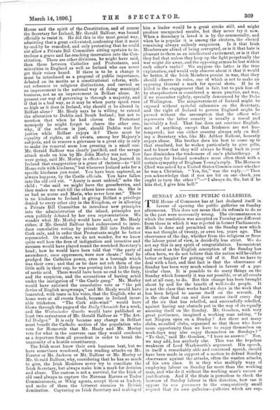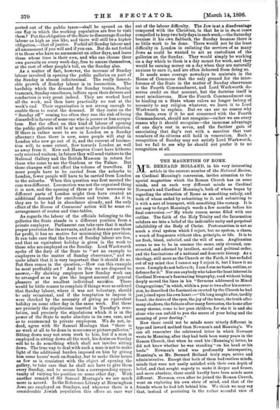SUNDAY AND THE PUBLIC GALLERIES.
THE House of Commons has at last declared itself in favour of opening the public galleries on Sunday afternoons. This does not mean that its refusals to do so in the past were necessarily wrong. The circumstances in which the resolution was accepted on Tuesday are different from those in which it was rejected in former Parliaments. Much is done and permitted on the Sunday now which was not thought of twenty, or even ten, years ago. The observance of the day, whether from the religious or from the labour point of view, is decidedly less strict. We do not say this in any spirit of congratulation. Inconsistent and unreal as the English conception of the Sunday has often been, we do not believe that the nation will be either better or happier for getting rid of it. But we have to deal with a fact, and that fact is that the observance of Sunday has been very much relaxed in favour of a par- ticular class. It is possible to do many things on the Sunday which formerly it was not possible, or at all events not at all easy, to do. But this change has been brought about by and for the benefit of well-to-do people. It is not the class that works hard six days in the week that has been helped to amuse itself on the seventh. It is the class that can and does amuse itself every day of the six that has rebelled, and successfully rebelled, against having any obstacle put in the way of its equally amusing itself on the Sunday. Mr. Goschen, with very great pertinence, imagined a working man asking, " Is not Niagara open on a Sunday ? Are there not many clubs, so-called clubs, organised so that those who have more opportunity than we have to enjoy themselves on week-days may also enjoy themselves on Sundays ? " "To that," said Mr. Goschen, "I have no answer." Nor, we may add, has anybody else. This was the hopeless weakness of Lord Warkworth's argument. His speech, in itself a remarkably able and convinced speech, should have been made in support of a motion to defend Sunday observance against the attacks, often the wanton attacks, of his own class. It is they who multiply ways of employing labour on Sunday far more than the working man, and who do it without the working man's excuse or justification. And if the State is powerless to check the increase of Sunday labour in this direction, how can it oppose its non poesumus to the comparatively small request that its own galleries—galleries which are sup. ported out of the public taxes—shall be opened on the one flay in which the working population are free to visit them? Put the obligation of the State to discourage Sunday labour as high as you like, and there will still be a higher obligation,—that of justice. Forbid all Sunday labour and all amusement if you will and if you can. But do not forbid it to those who have no amusement on other days, and leave those whose time is their own, and who can choose their own pursuits on every week-day, free to amuse themselves, at the cost of other people's toil, on the Sunday also.
As a matter of fact, however, the increase of Sunday labour involved in opening the public galleries on part of the Sunday is almost infinitesimal. The really lament- able growth of Sunday labour is in locomotion. The hardship which the demand for Sunday trains, Sunday tramcars, Sunday omnibuses, inflicts upon their drivers and conductors is very great indeed. They are worked hard all the week, and then have practically no rest at the week's end. Their organisation is not strong enough to enable them to resist the demand. If they insist on the 'Sunday off" coming too often they run the risk of being discarded in favour of some one who is poorer or less scrupu- lous. But the effect on this kind of labour of opening the public galleries will be at most to alter its distribution. If there is rather more to see in London on a Sunday afternoon than there is now, some people will stay in London who now go out of it, and the current of locomo- tion will, to some extent, flow towards London as well as away from it. Kew and Hampton Court have hitherto only received visitors; in future they will send visitors to the National Gallery and the British Museum in return for those who come to see the Gardens or the Palace. But these changes will not affect the volume of travellers. If more people have to be carried from the suburbs to London, fewer people will have to be carried from London to the suburbs. When this question was first mooted the case was different. Locomotion was not the organised thing it is now, and the opening of three or four museums in different parts of London might then have created an additional demand for omnibuses and trains. As it is, they are to be had in abundance already, and the only effect of the House of Commons' action will be some re- arrangement of routes and time-tables.
As regards the labour of the officials belonging to the galleries the State stands in a different position from a private employer. Parliament can take care that it makes proper provision for its servants, and as it does not use them for profit, it has no motive for minimising this provision. It can take care that the hours of Sunday labour are few, and that an equivalent holiday is given in the week to those who are employed on the Sunday. Lord Wark worth spoke of the duty of the State to "set an example to employers in the matter of Sunday observance," and we quite admit that it is very important that it should do so. But then comes in the question,—How can this example be most profitably set ? And to this we are disposed to answer,—By showing employers how Sunday work can be arranged so as to give the largest amount of general pleasure at the smallest individual sacrifice. There would be little reason to complain if things were so ordered that Sunday labour, where it was not voluntary, should ba only occasional, and if the temptation to impose it were checked by the necessity of giving an equivalent holiday on some other day in the same week. But these are precisely the stipulations inserted in Tuesday's reso- lution, and precisely the stipulations which it is in the power of the State to make absolute in its own case, and so to recommend to private employers. We do not, in- deed, agree with Sir Samuel Montagu that "there is no work at all to be done in museums or picture-galleries." Sitting down may not seem work to him, but if a man is employed in sitting down all the week, his desire on Sunday will be to do something which shall not involve sitting down. The true way to deal with such a man is not to make light of the additional burden imposed on him by giving him some hours' work on Sunday, but to make those hours as few as is consistent with the object of opening the gallery, to take care that he shall not have to give them every Sunday, .and to secure him a corresponding oppor- tunity of varying his position on some other day. With another remark of Sir Samuel Montagu's we are much more in accord. In the Reference Library at Birmingham Jews are employed on Sundays, and wherever there is a considerable Jewish population this offers an easy way out of the labour difficulty. The Jew is at a disadvantage compared with the Christian, in that he is in inQst cases compelled to keep two holy days in each week,—the Saturday because it his own Sabbath, the Sunday because there is so little work to be done. There would not be the least difficulty in London in enlisting the services of as many Jews as could be wanted to act as custodians of the galleries on the Sunday. They would simply be working on a day which to them is a day meant for work, and they would be earning money on a day when they are naturally anxious to earn it, and are often debarred from doing so.
It needs some courage nowadays to maintain in the House of Commons that the only ground for the inter- ference of the State in the matter of Sunday observance is the Fourth Commandment, and Lord Warkworth de- serves credit on that account, but the doctrine itself is most mischievous. How the Fourth Commandment can be binding on a State whose rulers no longer belong of necessity to any religion whatever, we leave it to Lord Warkworth to explain. But we can see no reason why the State, even if it be not concerned with the Fourth Commandment, should not recognise—rather we see every reason why it should recognise—the immense advantage of one day's rest in seven, and. the further gain of associating that day's rest with a sanction that vast numbers of its citizens still hold in veneration. Such a recognition of Sunday may not satisfy Lord Warkworth, but we fail to see why he should not prefer it to no recognition at all.







































 Previous page
Previous page